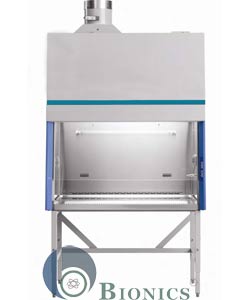Enhancing Laboratory Safety with Class 2 Biosafety Cabinets and Microbiological Protection

In today’s scientific and clinical labs, safety for personnel and samples is non-negotiable. Whether it's biotech development, pharmaceutical research, or microbiological analysis, biosafety cabinets form the backbone of contamination control.
Of all types, Class 2 cabinets are most commonly used due to their efficiency and versatility. These units are essential for labs working with infectious materials or clinical diagnostics.
Biosafety Cabinets – How They Work and Why They Matter
Biosafety cabinets are airflow-controlled workspaces engineered for microbiological safety. They use HEPA filtration to remove contaminants from incoming and outgoing air.
These units are generally classified into Classes I, II, and III depending on airflow and application needs. Among these, Class 2 cabinets are the most versatile and commonly used.
Defining Class 2 Biosafety Cabinets and Their Role
Class 2 Biosafety Cabinets ensure safety on all fronts—personnel, workspace, and biological material. They utilise downward laminar airflow within a sealed system.
Both incoming and outgoing air are HEPA-filtered to maintain sterility and prevent leaks. These cabinets are suited for clinical, research, and pharmaceutical lab applications.
Essential Features of Class 2 Safety Cabinets
A Class 2 microbiological safety cabinet includes several critical technologies such as:
• High-efficiency air filters to ensure clean workspace air
• Uniform downward airflow to protect the sample zone
• Inward airflow to keep aerosols contained
• Built-in UV sterilisation for decontaminating surfaces
• Quiet operation and ergonomic design for user comfort
• Front glass for full control and protection
These elements support lab workers in maintaining sterile working environments.
Where Class 2 Cabinets Are Used
Class 2 Biosafety Cabinets are commonly used across microbiology, biotechnology, diagnostics, and pharma. They are ideal for safe handling of samples during testing and experimentation.
From universities to private pathology labs, Class 2 cabinets ensure lab hygiene and sample integrity.
Why Laboratories Prefer Class II Safety Cabinets
Using Class 2 cabinets offers numerous benefits for safety, accuracy, and lab hygiene:
• Prevents contamination during sensitive procedures
• Acts as a barrier between user and biohazard
• Minimises lab contamination and pollution risks
These cabinets combine safety features with operational efficiency.
Design and Compliance Standards
Top manufacturers ensure their cabinets meet certifications like NSF 49, EN 12469, and WHO recommendations. Class 2 units are sub-classified as A1, A2, B1, and B2—based on varying airflow balance and ducting needs.
• Type A2: Recirculates 70% and exhausts 30% of filtered air
• Type Biosafety Cabinets B2: Used for hazardous vapors and chemicals
Matching the cabinet type to your process is essential.
Choosing the Right Biosafety Cabinet
Before purchasing, consider:
• Your application type (e.g., diagnostics, pharma, research)
• Cabinet dimensions, ducting needs, and room layout
• Ease of use, energy efficiency, and upkeep
• Warranty, training, and certification services
Working with reliable manufacturers provides peace of mind and technical guidance.
Best Practices for Using Class II Biosafety Cabinets
For optimal results:
• Minimise airflow interference during operation
• Schedule regular performance checks
• Educate staff on cabinet operations and safety
Operational best practices include:
• Use gloves, gowns, and face shields while operating
• Avoid sudden or quick arm movements
• Decontaminate surfaces before and after use
• Treat UV usage as an overnight sterilisation method
Final Thoughts on Class 2 Biosafety Cabinets
Class 2 biosafety cabinets are vital equipment in laboratories dealing with biohazards. They protect workers, secure samples, and copyright environmental standards.
From biotech and diagnostics to academia and pharma, Class II cabinets copyright the highest biosafety levels. When investing in a biosafety cabinet, choose performance and reliability over cost-cutting—because lab safety is non-negotiable.